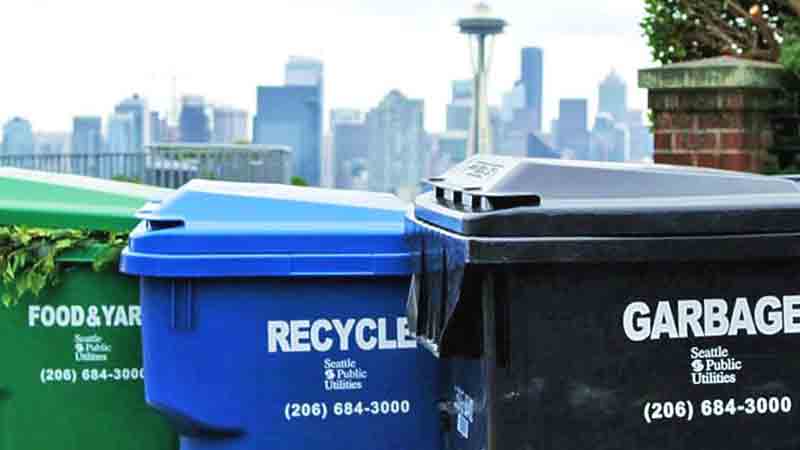Top: The white paper recommends that cities give equal priority to collection services for trash, recycling and organics. Photo courtesy of Seattle Public Utilities
Reloop North America and the National League of Cities released a white paper in mid-November, “Beyond Recycling: Policy to Achieve Circular Waste Management,” that scopes out policy tools cities can promote at the local, state and federal level to accelerate the transition to a just and equitable circular economy. “Recycling and diversion rates have plateaued for several years, and there is serious risk that we are moving backward at a time when we urgently need to make rapid progress,” state the authors, who interviewed subject matter experts, city officials and others to tease apart major systemic challenges and suggest policy tools that play a part in a bold and sustainable vision for more circular waste management.
 The introduction to “Beyond Recycling” notes that only 53% of households in the U.S. have universal access to residential curbside recycling, and that approximately 17% of material collected for recycling by weight is contamination that is not recyclable and can ruin other recyclables. “Efforts to educate residents and reduce contamination may be part of the solution, but these are inadequate to meet the current challenge and miss entirely the structural problems at play,” says the paper. “Cities need the support of haulers, materials processors and private consumer product manufacturers to change policy at all levels of government — and put America on a serious path toward zero waste.”
The introduction to “Beyond Recycling” notes that only 53% of households in the U.S. have universal access to residential curbside recycling, and that approximately 17% of material collected for recycling by weight is contamination that is not recyclable and can ruin other recyclables. “Efforts to educate residents and reduce contamination may be part of the solution, but these are inadequate to meet the current challenge and miss entirely the structural problems at play,” says the paper. “Cities need the support of haulers, materials processors and private consumer product manufacturers to change policy at all levels of government — and put America on a serious path toward zero waste.”
Two core principles in the transition to circular waste management are to embrace the circular economy — a new system where no resources go to a landfill, but rather are designed for repair and reuse — and to maintain local authority, which is essential to collection of material for recycling and solid waste. One recommended action that cities can take is to give equal priority to collection services for trash, recycling and organics. “For most Americans, it is far too easy to throw everything in the trash,” explain the authors. “Recycling or composting relies on much more time, effort or individual education. Moving towards circularity means waste management requires universal access to trash, recycling and compost collection with equal levels and frequency of service. Cities should ensure that what happens with commercial material is at least as robust as what happens to residential material.”
Additional recommended actions are to spur market demand by adopting standards for Environmentally Preferential Procurement (EPP), support or incentivize local business to adopt EPP, and set clear standards for wellbeing and equity in sanitation services. These recommendations are only possible to implement with support from states, federal government, producers, haulers and processors who participate in waste management, emphasizes the paper. To get the support cities need, “Beyond Recycling” recommends that state or local governments do the following:
- Establish extended producer responsibility (EPR) that makes manufacturers accountable for effective recycling of products and minimize environmental impacts throughout their lifecycle
- Adopt minimum recycled content mandates that are consistent, aggressive and achievable
- Collaborate to create standardized guidelines for recyclability and labeling
- Enable oversight agencies to establish an effective data and metrics system for quality control and material traceability










